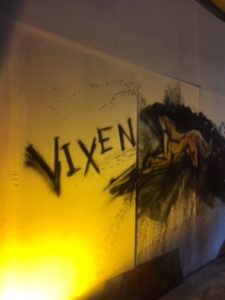
The title, simply, is Vixen. It’s not The Cunning Little Vixen or Russ Meyer’s Vixen, though it was closer to the former than the latter. And true to the foxiness of the title, you had to hunt it down.
Ostensibly an adaptation of the Janacek opera, Vixen was presented by a company called Silent Opera in conjunction with the English National Opera, and in a site nowhere near the ENO headquarters at the London Coliseum. The venue was something called The Vaults, tucked away behind Waterloo Station off Lower Marsh Street, with near-daily performances with singers who literally seemed to come out of the woodwork in the three rooms where it was played. (That was in London for much of June, prior to performances in Beijing and Helsinki.
As re-imagined by director Daisy Evans, the production acknowledges Janacek’s folk roots more readily than what one hears amid the composer’s sumptuous orchestration. Most significant, the opera was taken out of its pleasantly woodsy setting and into gritty, modern urban terrains in ways that were convincing, not to mention thrilling.
The original’s quaint story about a cunning little vixen’s checkered relationship to the human world is recast as a story about a runaway girl living on the street, attempting to survive without resorting to drugs or prostitution. The forester of the opera takes her to a haven of sorts for runaways that may not be any safer than life on the street, since the other runaways are easily capable of overpowering her. She escapes, finds a mate on the streets and set up housekeeping in some hovel underneath a bridge.
The audience was greeted in the lobby with the prelude played by folk instruments such as fiddle and clarinet. Inside, two rooms unfolded, a large rectangular space representing the outdoor scenes and a smaller rear room where indoor scenes took place. In both of those room, listeners had their own set of headphones with pre-recorded instrumental accompaniment for the singers, who sang live (and in English) but with body mikes that allowed the sound picture to be properly mixed, no matter where anybody was physically positioned in the performing space. With the audience sitting more or less among the singers, there was both physical immediacy and clarity of what was being said and sung. Wisely, the musical adaptation by Max Pappenheim and Stephen Higgins benefited from having Pappenheim also involved with the sound design (along with David Gregory).
None of this sounds startling in today’s world of heavily adapted, stripped down and updated opera productions, However, this was not only one of the better operatic experiences I’ve had all year, but also a template of sorts for productions of similar temperament. Just before going to London, I saw Heartbeat Opera’s Madame Butterfly in New York, which had the Puccini opera adapted for a chamber setting with the order of the first two acts reversed and choral scenes cut. I admired the ingenuity of Heartbeat’s Butterfly only up to a point: The production was fixing something that didn’t need it.
Such adaptations are important for reminding audiences (and hopefully producers) how dramatically vital these classic operas can be in more traditional settings. But for me, that Butterfly didn’t say anything very new about the piece, even in the more skillful moments of distilling grand opera down to something less than grand. This sort of thing has been going on at least since the 1980s, when Peter Brook created The Tragedy of Carmen out of Bizet’s larger masterpiece.
Vixen reversed that equation: The production had an important story to tell and used the opera to tell it. That way, it wasn’t a footnote to something larger and greater or a consolation prize for its lower production budget. This was its own thing. It was no smaller or larger than it needed to be in order to tell its story effectively. And it did: the story’s theme of rebirth in the face of cold-hearted humanity – the vixen is killed but her daughter seems to replace her in the ecosystem – left me both elated and devastated.
Of course, such a project needs the right singers. Not every Vixen is going to be as able as Rosie Lomas (a light lyric soprano) to sing Janacek’s quirky vocal lines, give a fully realized dramatic performance and be so physically slight that the Forester was able to pick her up with one arm. Ivan Ludlow’s Forester caught that male-macho nexus between low-class loutishness and a higher consciousness that drifts in and out. The other five singers formed an excellent ensemble – in a package whose details were perhaps best appreciated by those who know the opera in advance, but with a theatricality that non-operatic audiences are likely to find entrancing.
The piece has legs (as previously stated, it’s headed to Beijing and Helsinki). And director Evans is in the midst of a young-artist residency that could have her translating her operatic visions to stages that are larger – and, hopefully, more easily located.


Fascinating description. Perhaps one day it will be played on this side of the Atlantic…